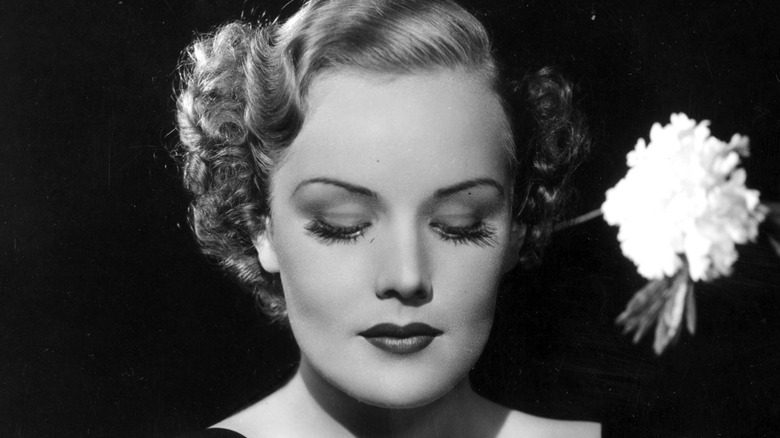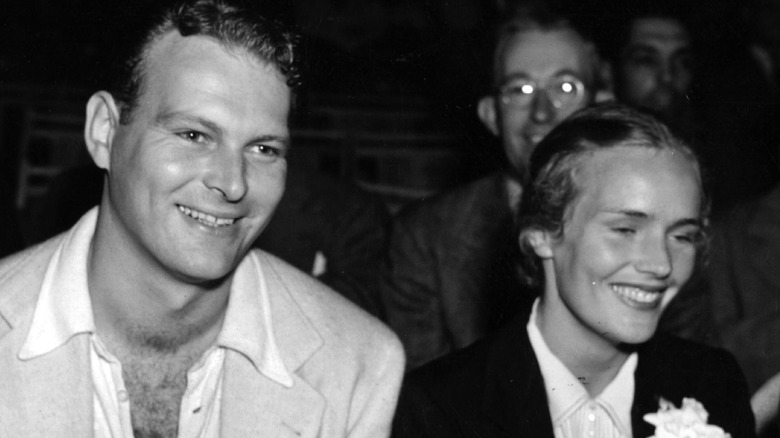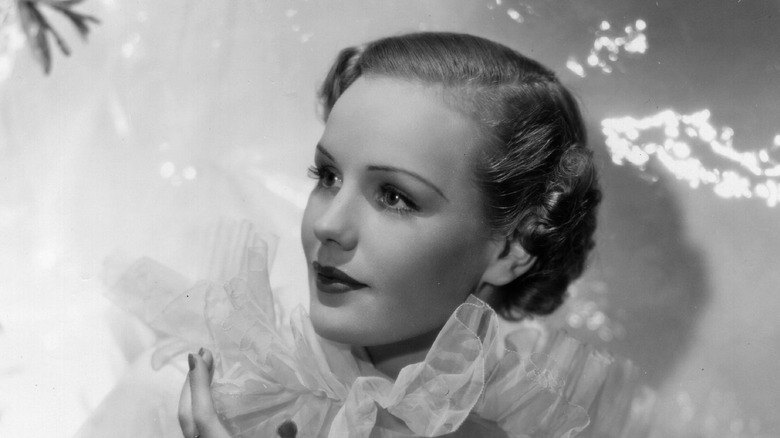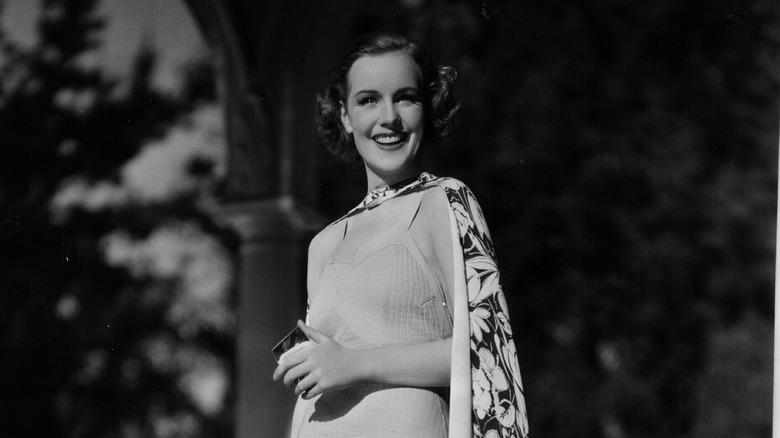Frances Farmer's Glamorous Hollywood Future Ended In A Psychiatric Hospital
The following article includes allegations of abuse and sexual assault.
In 1993, Nirvana released "In Utero." Track five on their now-iconic album is titled "Frances Farmer Will Have Her Revenge on Seattle." According to Far Out Magazine, lead singer Kurt Cobain felt a kinship with Farmer, a Hollywood actress that is remembered less for her filmography and more for her public struggles with her mental health. Born in Seattle, Washington in 1913, HistoryLink explains that Farmer was perhaps always destined to be a star shrouded in controversy. In 1931, Farmer, who was then a high schooler, made the news for writing an award-winning essay titled "God Dies."
TCM reported that Farmer later attended the University of Washington where she once again made waves. Per HistoryLink, Farmer had aspirations to become an actress and was involved in the university's productions. She longed to go to Broadway but did not have the money to do so. Farmer's solution was to enter an essay contest for The Voice of Action, a socialist-inspired publication. Farmer won the contest and with it a trip to the Soviet Union. However, the prize also included bus fare so Farmer could travel from Seattle to New York, where she was set to depart for Moscow.
Farmer went to Russia and when she returned to New York, she decided to stay (via HistoryLink). The New York Times wrote that this venture paid off; the notoriety from Farmer's trip to the Soviet Union landed her a contract with Paramount Pictures.
Frances Farmer goes to Hollywood
According to TCM, Paramount quickly put Farmer to work in 1936. The Washington Post noted that she made four films that year, including the hit "Come and Get It." Directed by Howard Hawks (per HistoryLink), Farmer plays two roles; that of a mother and a daughter. Both the film and Farmer's performance were widely acclaimed. Gossip columnist Louella Parsons announced (via The Washington Post) that Farmer was going to be "bigger than Garbo." Per The New York Times, the young actress was also touted as "the brightest star Hollywood has discovered in decades." However, Farmer found the industry frivolous and yearned for the stage.
By 1937, Farmer had returned to the East Coast to do theater work (via The New York Times). She was later cast in a popular Broadway play called "Golden Boy." Despite this, TCM reported that Farmer continued to make films including "The Toast of New York." Shortly after, HistoryLink explains that Farmer's misfortune began. Two of her plays failed to make waves and an affair she had with playwright Clifford Odet, came to end. Furthermore, she was sued by an agent who claimed that Farmer owed him thousands.
The Washington Post adds that her first marriage to actor Leif Erickson (pictured above) also crumbled and Farmer subsequently turned to alcohol and drugs. She was later hired to star in a production of the Ernest Hemingway play "The Fifth Column" but was let go (via HistoryLink).
A movie star's downfall
Although Farmer's personal life was in shambles, TCM reported that she continued to make films in the early 1940s. However, HistoryLink noted that these films failed to provide her floundering career with momentum. Instead, Farmer's drinking worsened, and in October 1942, she was stopped by a police officer for driving with headlights on during a war blackout. Farmer got into an argument with the officer and told him "you bore me." This resulted in her arrest, a fine, and a slew of charges including driving under the influence. Meanwhile, Farmer had gained a negative reputation in the entertainment industry and things came to a head in 1943.
Per The Washington Post, Farmer was on the set of a film when she got into an altercation with a hairdresser. Farmer hit her and was later arrested when it was discovered that she had failed to pay the fee for her drunk driving charges (via HistoryLink). She was sent to jail but was later transferred to a psychiatric hospital where TCM wrote that she was diagnosed with manic depression.
From then on, Farmer was sent to various institutions and endured insulin shock therapy, which involves injecting patients with large doses of the hormone. She was eventually released and placed in her mothers care. According to HistoryLink, Farmer and her mother, Lillian Farmer, had a tumultuous relationship and by 1944, her mother had committed her to the Western Washington State Hospital.
Frances Farmer's later years
Per TCM, Farmer was given electric shock therapy and released from the Western Washington State Hospital after three months. Shortly after, she was arrested for vagrancy in California and sent back to the institution (via HistoryLink). Farmer remained here for the next five years and allegedly endured horrific abuse from her caretakers, amongst others. Farmer stated that she was chained to her cell and overall, treated inhumanely. The Washington Post reported that Farmer was allegedly raped by other patients, orderlies, and soldiers. In addition, it's been alleged that Farmer may have received a lobotomy, a claim that the hospital later denied.
Upon her release in 1950, the HistoryLink explains that Farmer married for a second time. Her relationship with her parents deteriorated and she moved to Eureka, California, where she left her husband and found work as a secretary. Then in 1957, Farmer decided to return to the limelight with the help of her third husband, Lee Mikesell. Farmer made TV appearances and starred in a theater production of "The Chalk Garden." She later moved to Indianapolis and hosted her own local TV show called "Frances Farmer Presents."
Despite this upturn in her life, HistoryLink wrote that Farmer still struggled with mental illness and alcoholism. According to The New York Times, Farmer died in August 1970 at the age of 56 from esophageal cancer. At the time of her death, Farmer was working on a memoir, "Will There Really be a Morning." The book was posthumously released in 1972.
If you or anyone you know has been a victim of sexual assault, help is available. Visit the Rape, Abuse & Incest National Network website or contact RAINN's National Helpline at 1-800-656-HOPE (4673).



